Summary of Findings
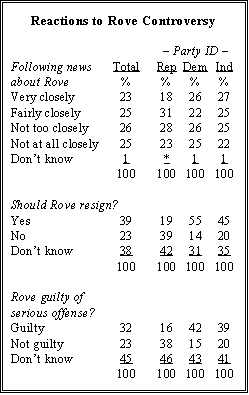
Only about half of the American public is paying close attention to news reports that White House aide Karl Rove may have leaked classified information about a CIA agent. But 39% of the public and a solid majority of those closely following the reports (58%) believe that Rove should resign his position.
While there is a partisan cast to views on Rove’s fate, Republican support for the influential White House aide has been tepid. As many Republicans declined to offer an opinion (42%) as say Rove should not step down (39%). However, public opinion is still forming on this matter. Nearly half of all Americans (45%) declined to offer an opinion on whether Rove is guilty of a serious offense; 32% feel he is guilty of a serious offense while 23% say he is not.
The latest national survey by the Pew Research Center for the People & the Press, conducted July 13-17 among 1,502 Americans, finds that more Americans favor a nominee for the Supreme Court who will keep the court as it is now (40%), rather than someone who will make the court more conservative (27%), or more liberal (24%). On balance, there is greater concern that Bush will select someone who will make the court too conservative, rather than not conservative enough (by 31% to 19%).
Nearly half of the public (47%) says the choice of a new justice to replace Sandra Day O’Connor is very important to them personally, with Democrats, independents, and Republicans about equally likely to feel this way. The public is divided over the question of whether the upcoming nomination is more controversial than appointments in the past: 44% say it is, while 44% say the level of controversy is about the same and 5% say it’s less controversial. Among those seeing greater controversy now, the blame for fueling the dispute is divided equally between Democrats (39%) and Republicans (37%).
Thus far, few Americans say they have been contacted by interest groups on the left and right who are expected to do battle over the nomination. Only 3% of the poll’s respondents say they have been contacted by individuals or groups asking for support for their position in the nomination fight.
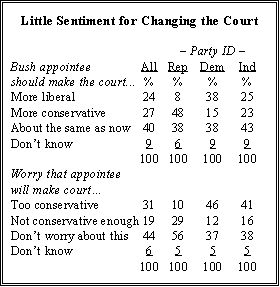
Opinions on the court’s future ideological balance have changed little over the past few months. In June and March, comparable pluralities expressed the view that Bush should pick a nominee who will keep the court about as it is now (35% June, 41% March). The partisan differences in these attitudes, while substantial, are not overwhelming. Even among Republicans, less than half (48%) want to see Bush nominate someone who would move the court to the right. And similarly among Democrats, just 38% say he should pick someone who would make the court more liberal.
Attorney General Alberto Gonzales has been widely mentioned as a possible candidate for the vacancy, and about half of the public has heard at least a little about this possibility (11% a lot, 41% a little). Those who have heard about the possibility are divided as to whether it’s a good idea or not 29% say it’s a good idea, 30% say it’s a bad idea. Despite some grumbling by conservative groups about a possible Gonzales appointment, by more than three-to-one conservative Republicans in the poll think picking Gonzales would be a good idea (42%) rather than a bad idea (12%).
Public interest in O’Connor’s retirement was modest, with 24% following the news very closely. Democrats, Republicans, and independents were equally interested in the story. Justice O’Connor’s public legacy on the court is largely as a moderate, with 51% saying her judgments were middle-of-the-road. About as many say she was liberal (10%) as conservative (13%). Perceptions of O’Connor by Democrats, Republicans, and independents are strikingly similar.
Opinions on Rove
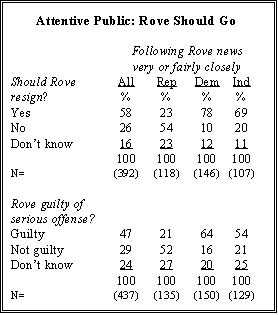
The survey finds that attention to the Rove story is comparable to interest in past Washington controversies, including the 1997 ethics charges against House Speaker Newt Gingrich, former Senate Majority Leader Trent Lott’s resignation in 2003 following remarks at Strom Thurmond’s birthday party, and charges in 1991 that then-White House chief of staff John Sununu used military aircraft for personal trips. But the story has much greater resonance than the recent ethics complaints made against House Majority Leader Tom DeLay.

As many independents as Democrats are paying close attention, and independents are nearly as negative toward Rove as Democrats are. While a majority of Democrats (55%) think Rove should resign, so too do 45% of independents including fully 69% of independents following the story closely. Republicans are not yet jumping to Rove’s defense. More than half of Republicans who have been closely following reports on Rove believe he should not resign (54%), but nearly as many either favor his resignation (23%) or offered no opinion (23%).
Bush’s Character Seen More Negatively
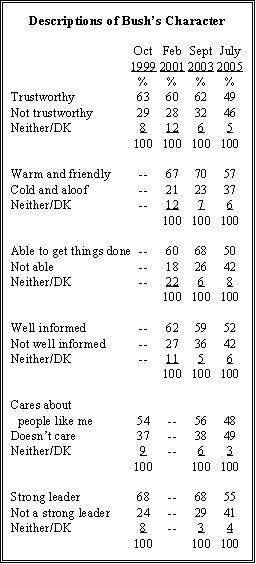
The survey shows that President Bush’s personal character is being viewed more negatively. Public views of Bush’s trustworthiness, empathy and leadership have all declined significantly since 2003. But the biggest decrease has been in perceptions of Bush’s effectiveness, perhaps reflecting the stubborn challenges he faces at home and abroad. The number saying that Bush is “able to get things done” now stands at just 50%, down from 68% in September 2003.
The number describing Bush as trustworthy has fallen 13 points over the same period, and there are indications that the Rove controversy is contributing to the president’s lower rating in this area. An analysis of the data shows that those who believe that Rove has committed a serious offense are somewhat less likely than others to view Bush as trustworthy, even taking account of such factors as partisanship and opinions on Bush’s job performance.
Perceptions of Bush’s character also have become much more partisan. Just 28% of Democrats say Bush is able to get things done, only about half the number who said that in September 2003 (55%).
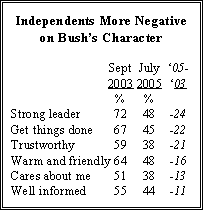
But independents also have grown more skeptical of Bush’s effectiveness. Currently, fewer than half of independents (45%) say they believe Bush can get things done, down from 67% in September 2003. Independents are much more critical of Bush in other areas as well. Only about half of independents (48%) view Bush as a strong leader, compared with 72% two years ago. Bush’s rating for trustworthiness among independents has suffered a comparable decline. About four-in-ten (38%) say he is trustworthy, a decline of 21 percentage points from September 2003.
Republicans continue to express highly positive opinions of Bush’s character and effectiveness. Bush gets his highest ratings among Republicans for trustworthiness (88%), leadership (87%), warmth (86%) and empathy (86%). Democrats have soured on Bush across the board; positive ratings range from a high of 37% (for warmth) to a low of 20% (for personal empathy).
Bush Slips on Terrorism
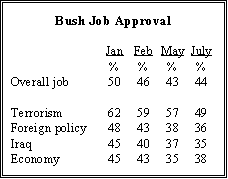
Currently, 44% approve of Bush’s overall job performance, while 48% disapprove. That is fairly consistent with his marks in recent months, although in the immediate aftermath of the London terrorist bombings somewhat more (47%) approved of his job performance.
Bush’s positive ratings for several major issues the economy, foreign policy and the war in Iraq remain in the mid- to high 30% range. In addition, since May there has been a significant decline in the number approving of Bush’s handling of terrorist threats; 49% rate Bush positively in this area, down from 57% in May. That equals the lowest rating Bush has received on terrorism since the Sept. 11, 2001 attacks (49% in mid-October 2004).
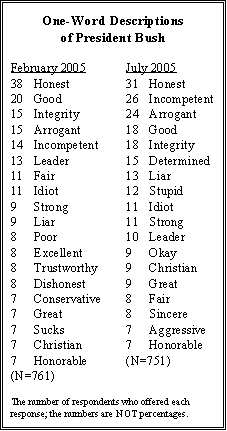
Independents, in particular, have become more critical of Bush’s handling of terrorist threats. In May, a solid majority of independents (56%) approved of Bush’s performance in this area; currently, independents are split (43% approve/44% disapprove). The number of Democrats who approve of Bush’s handling of this issue also has declined (from 35% in May to 28%).
Bush…in a Word
One word impressions of President Bush were slightly more negative than positive (40% vs. 36%); 12% were neutral or not clearly positive or negative. As with several previous surveys that have tapped this top-of-the-mind association with the president, the most frequent response was “honest.” Close behind were two negative terms: “incompetent” and “arrogant.” Other frequently mentioned positive terms included “good,” “integrity,” and “determined.” Other popular negative words included “liar,” “stupid,” and “idiot.” Common neutral or ambiguous responses included “fair,” “aggressive,” and “adequate.”
Most View Bush as a Conservative
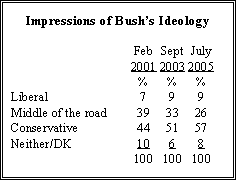
Public perceptions of Bush’s ideology also have changed, though less dramatically, since 2003. Nearly six-in-ten (57%) believe Bush is a conservative; fewer than half as many (26%) describe him as middle of the road. In 2003, a narrower majority (51%) saw Bush as a conservative. Over the longer term, however, views of Bush’s ideological leanings have changed significantly. In February 2001, shortly after Bush took office, nearly as many described Bush as middle of the road as saw him as conservative (39% vs. 44%).
By more than two-to-one (53%-23%), the public says that Bush listens to more conservative, rather than moderate, members of his party. The balance of opinion on this measure has not changed much since the start of Bush’s presidency; however, in January 2002, when Bush still retained extraordinarily high approval ratings in the aftermath of 9/11, roughly as many said Bush listened more to moderate Republicans as to conservatives (40% vs. 38%).
News Interest Index
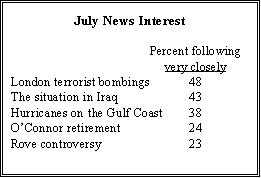
The July 7 terrorist bombings in London are the top story in this month’s news interest index, with 48% of Americans saying they followed coverage of the attacks very closely. News about the current situation in Iraq also remains a top interest of the American public; 43% followed this story very closely, about the same as last month (41%).
So far, roughly four-in-ten (38%) Americans have paid very close attention to the recent hurricanes affecting the Gulf Coast of the U.S. The public is less engaged than it was when Hurricane Isabel struck in March 2003 (47% following very closely), but the current level of interest is the same as for hurricanes in the Gulf of Mexico and off the Louisiana coast in October 2002 (38% very closely). Not surprisingly, interest in the recent storms was highest in the South (52% very closely).
About a quarter (24%) followed coverage of Justice Sandra Day O’Connor’s retirement from the Supreme Court very closely. Voters at the far ends of the political spectrum tend to be more engaged in this story than those in the center; 35% of liberal Democrats and 30% of conservative Republicans followed this very closely, compared with 19% of conservative/moderate Democrats and 17% of moderate/liberal Republicans. College graduates were also particularly interested in the O’Connor retirement (38% very closely).
As mentioned above, 23% of Americans say they paid very close attention to the controversy surrounding Karl Rove and the identification of CIA operative Valerie Plame. Meanwhile, only 11% very closely followed the bid by the China National Overseas Oil Corporation to purchase the American oil company Unocal.




